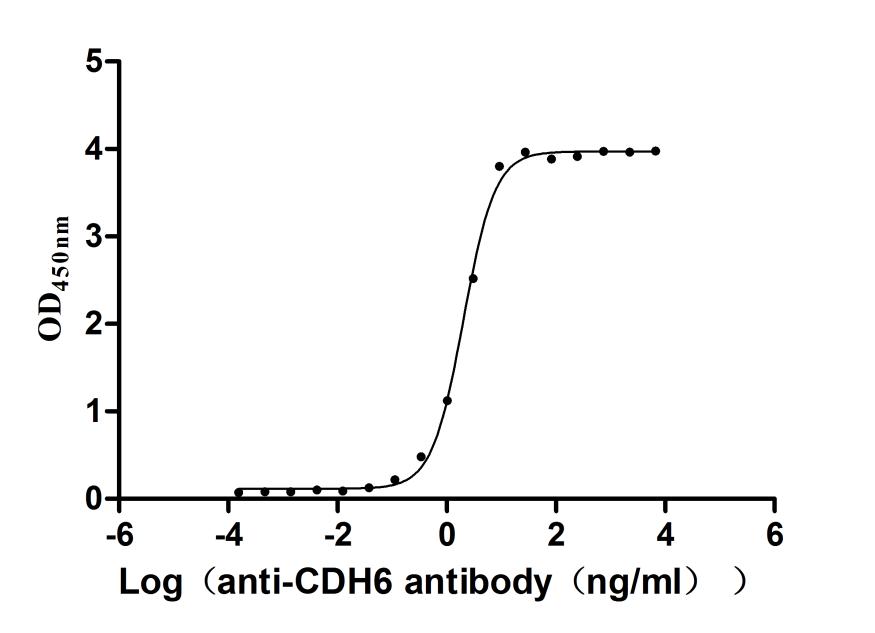Recombinant Rat Cadherin-1 (Cdh1), partial
-
中文名称:Recombinant Rat Cadherin-1(Cdh1),partial,Yeast
-
货号:CSB-YP889927RA
-
规格:
-
来源:Yeast
-
其他:
-
中文名称:Recombinant Rat Cadherin-1(Cdh1),partial,Yeast
-
货号:CSB-EP889927RA
-
规格:
-
来源:E.coli
-
其他:
-
中文名称:Recombinant Rat Cadherin-1(Cdh1),partial,Yeast
-
货号:CSB-EP889927RA-B
-
规格:
-
来源:E.coli
-
共轭:Avi-tag Biotinylated
E. coli biotin ligase (BirA) is highly specific in covalently attaching biotin to the 15 amino acid AviTag peptide. This recombinant protein was biotinylated in vivo by AviTag-BirA technology, which method is BriA catalyzes amide linkage between the biotin and the specific lysine of the AviTag.
-
其他:
-
中文名称:Recombinant Rat Cadherin-1(Cdh1),partial,Yeast
-
货号:CSB-BP889927RA
-
规格:
-
来源:Baculovirus
-
其他:
-
中文名称:Recombinant Rat Cadherin-1(Cdh1),partial,Yeast
-
货号:CSB-MP889927RA
-
规格:
-
来源:Mammalian cell
-
其他:
产品详情
-
纯度:>85% (SDS-PAGE)
-
基因名:
-
Uniprot No.:
-
别名:Cdh1Cadherin-1; Epithelial cadherin; E-cadherin; Uvomorulin; CD antigen CD324) [Cleaved into: E-Cad/CTF1; E-Cad/CTF2; E-Cad/CTF3]
-
种属:Rattus norvegicus (Rat)
-
蛋白长度:Partial
-
蛋白标签:Tag type will be determined during the manufacturing process.
The tag type will be determined during production process. If you have specified tag type, please tell us and we will develop the specified tag preferentially. -
产品提供形式:Lyophilized powder
Note: We will preferentially ship the format that we have in stock, however, if you have any special requirement for the format, please remark your requirement when placing the order, we will prepare according to your demand. -
复溶:We recommend that this vial be briefly centrifuged prior to opening to bring the contents to the bottom. Please reconstitute protein in deionized sterile water to a concentration of 0.1-1.0 mg/mL.We recommend to add 5-50% of glycerol (final concentration) and aliquot for long-term storage at -20℃/-80℃. Our default final concentration of glycerol is 50%. Customers could use it as reference.
-
储存条件:Store at -20°C/-80°C upon receipt, aliquoting is necessary for mutiple use. Avoid repeated freeze-thaw cycles.
-
保质期:The shelf life is related to many factors, storage state, buffer ingredients, storage temperature and the stability of the protein itself.
Generally, the shelf life of liquid form is 6 months at -20°C/-80°C. The shelf life of lyophilized form is 12 months at -20°C/-80°C. -
货期:Delivery time may differ from different purchasing way or location, please kindly consult your local distributors for specific delivery time.Note: All of our proteins are default shipped with normal blue ice packs, if you request to ship with dry ice, please communicate with us in advance and extra fees will be charged.
-
注意事项:Repeated freezing and thawing is not recommended. Store working aliquots at 4°C for up to one week.
-
Datasheet :Please contact us to get it.
相关产品
靶点详情
-
功能:Cadherins are calcium-dependent cell adhesion proteins. They preferentially interact with themselves in a homophilic manner in connecting cells; cadherins may thus contribute to the sorting of heterogeneous cell types. CDH1 is involved in mechanisms regulating cell-cell adhesions, mobility and proliferation of epithelial cells. Has a potent invasive suppressor role. It is a ligand for integrin alpha-E/beta-7.; E-Cad/CTF2 promotes non-amyloidogenic degradation of Abeta precursors. Has a strong inhibitory effect on APP C99 and C83 production.
-
基因功能参考文献:
- Cdk5-mediated inhibition of APC/C-Cdh1 switches on the cyclin D1-Cdk4-pRb pathway causing aberrant S-phase entry of postmitotic neurons PMID: 26658992
- astrocyte proliferation can be effectively suppressed by down-regulation of PFKFB3 through control of glycolytic flux, which is downstream of Cdh1 PMID: 26498254
- CIP4 overexpression represses E-cadherin expression by promoting beta-catenin translocation to the nucleus. PMID: 26287173
- Results suggest a regulatory function of E-cadherin that modulates Nrg1 signaling and promotes Schwann cell myelin formation PMID: 25988855
- E-cadherin expression and apoptosis may contribute to the development of Adriamycin nephrotoxicity PMID: 25801296
- Zinc can modulate N-cadherin-mediated adhesion. PMID: 25579424
- These results suggest that the anaphase-promoting complex-Cdh1 may play an important role in inhibiting axonal growth. PMID: 24634235
- results suggest that Cdh1 plays an important role in the regulation of reactive astrocyte proliferation induced by oxygen-glucose deprivation and reperfusion PMID: 23727062
- the total amount of E-cadherin expressed in animals subjected to diversion of the fecal stream for 6, 12, and 18 weeks was reduced in segments without a fecal stream. PMID: 23273176
- Cadmium disrupts the cadherin/beta-catenin complex in rat kidney cells, this effect leads to partial activation of beta-catenin-mediated gene transcription. PMID: 23080431
- E-cadherin is critical for collective sheet migration and is regulated by the chemokine CXCL12 protein during restitution PMID: 22549778
- The retaining of E-cadherin in cell-cell adhesion junctions affects the locomotor activity of transformed epithelial cells and plays an important role in their collective migration. PMID: 22288108
- E-cadherin can be expressed by a small population of rat undifferentiated spermatogonia in vivo and in vitro. PMID: 21853397
- beta-pix forms a complex with cadherin, beta-catenin, and scribble at synapses and enhances localized actin polymerization in rat hippocampal neurons. PMID: 22114281
- expression of E-cadherin and alpha-catenin was significantly associated with the ROS and degenerative changes in the seminiferous tubules. PMID: 21399649
- Expression of E-cadherin and claudin-4 has a circadian rhythm. The dynamic change in protein levels of E-cadherin and claudin-4 seems to coincide with that in the level of sodium excretion in rats. PMID: 20091493
- disappearance of the marginal actin bundle and rearrangements of AJs may change the adhesive function of E-cadherin and play an active role in migratory activity of carcinoma cells PMID: 19956566
- Fast dissociation kinetics between individual E-cadherin fragments revealed by flow chamber analysis PMID: 12032067
- Cadherin regulates dendritic spine morphogenesis and related synaptic functions, presumably cooperating with cadherin-independent adhesive mechanisms to maintain spine-axon contacts. PMID: 12123610
- E-cadherin expression is inversely proportional to tumor size in experimental liver metastases. PMID: 12127823
- calcitonin induced reduction in E-cadherin expression may remodel the adherens junctions between epithelial cells PMID: 12237291
- different regulation during axonal reorganization in the adult rat CNS PMID: 12387456
- In cochlea, E-cad expression is prominent in Hensen cells, Claudius cells, the outer sulcus, the future stria vascularis, and the epithelium (inner layer) of Reissner's membrane. PMID: 12640664
- Expression is decreased in iron-loaded hepatocytes PMID: 12651624
- Comparison of the expression patterns of E- and P-cadherins during wound healing of the epidermis strongly suggests that these two cadherins play distinct roles in re-epithelialization. PMID: 15771627
- It is concluded that CD2AP interacts with E-cadherin and co-localizes with F-actin in the leading edge of migrating cells, and significantly contributes to cell migration in restituting gastric epithelium. PMID: 15910750
- Ras signaling causes an upregulation of transcriptional repressors and subsequent downregulation of E-cadherin as a malignant phenotype is propagated PMID: 16153441
- Findings demonstrate a stimulatory role for E-cadherin in proliferative regulation, and identify a simple mechanism by which cell-cell contact may trigger or inhibit epithelial cell proliferation in different settings. PMID: 16682529
- results suggest that loss of beta-catenin precedes the onset of programmed cell death, loss of E-cadherin and extrusion from the villi. PMID: 16733663
- Heparin and enoxaparin can reduce E-cadherin expression in rat pregnancy which might modulate trophoblast invasion. PMID: 16997938
- Loss of E-cadherin expression is associated with bladder cancer progression PMID: 17167984
- A tight control of E-cadherin expression depending on the differentiation stage of the progenitor cells, is suggested. PMID: 17605082
- trefoil factor 3, in contrast to epidermal growth factor, enhanced a collective cell migration ensuring a precise coverage of the re-populated area avoiding gaps PMID: 17762162
- Cell adhesion via ECAD has distinct roles in the regulation of intercellular communication between beta-cells within islets, with potential repercussions for insulin secretion. PMID: 17982281
- These findings demonstrate a novel role for cell-cell adhesion in polarization, and have implications for wound healing and developmental patterning. PMID: 19258396
- These findings reveal a direct role for E-cadherin and for matrix metalloproteinases in causing epithelial-mesenchymal transition downstream of TGF-beta1 in fibrotic disease. PMID: 19590041
显示更多
收起更多
-
亚细胞定位:Cell junction, adherens junction. Cell membrane; Single-pass type I membrane protein. Endosome. Golgi apparatus, trans-Golgi network.
-
数据库链接:
KEGG: rno:83502
STRING: 10116.ENSRNOP00000027346
UniGene: Rn.1303
Most popular with customers
-
Recombinant Human Signal transducer CD24 (CD24)-Nanoparticle (Active)
Express system: Mammalian cell
Species: Homo sapiens (Human)
-
Recombinant Human Angiopoietin-2 (ANGPT2) (Active)
Express system: Mammalian cell
Species: Homo sapiens (Human)
-
Recombinant Dog B-lymphocyte antigen CD20 (MS4A1)-VLPs (Active)
Express system: Mammalian cell
Species: Canis lupus familiaris (Dog) (Canis familiaris)
-
Recombinant Human Lymphocyte antigen 6 complex locus protein G6d (LY6G6D) (Active)
Express system: Yeast
Species: Homo sapiens (Human)
-
Recombinant Macaca fascicularis C-type lectin domain family 4 member C(CLEC4C), partial (Active)
Express system: Mammalian cell
Species: Macaca fascicularis (Crab-eating macaque) (Cynomolgus monkey)
-
Recombinant Human Dipeptidase 3(DPEP3), partial (Active)
Express system: Mammalian cell
Species: Homo sapiens (Human)
-
Recombinant Human Tumor necrosis factor ligand superfamily member 15(TNFSF15) (Active)
Express system: Mammalian cell
Species: Homo sapiens (Human)
-
Recombinant Mouse Cadherin-6(Cdh6),partial (Active)
Express system: Mammalian cell
Species: Mus musculus (Mouse)


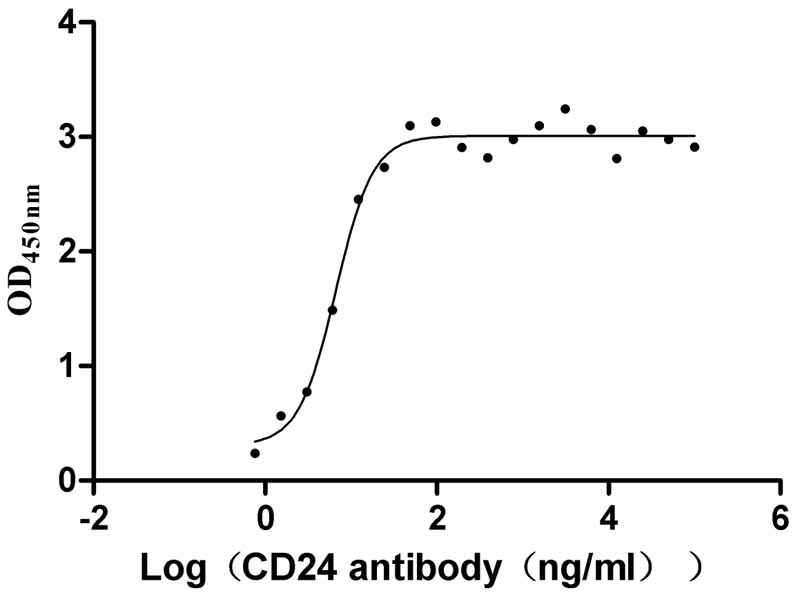
-AC1.jpg)
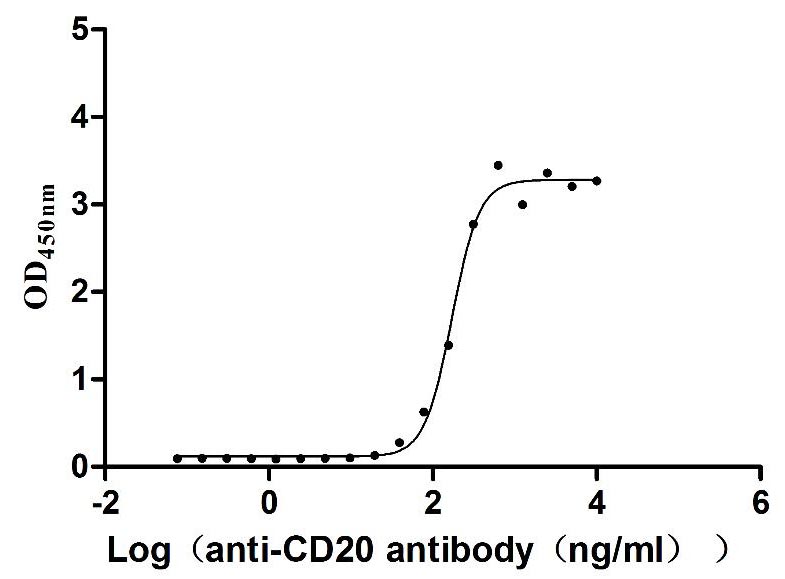
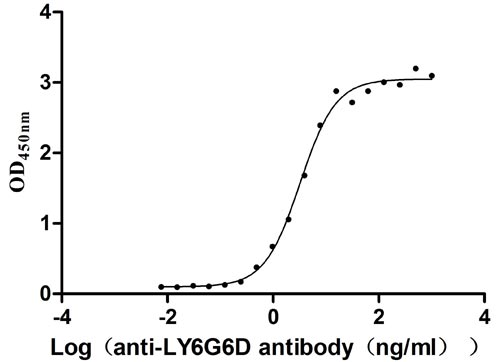
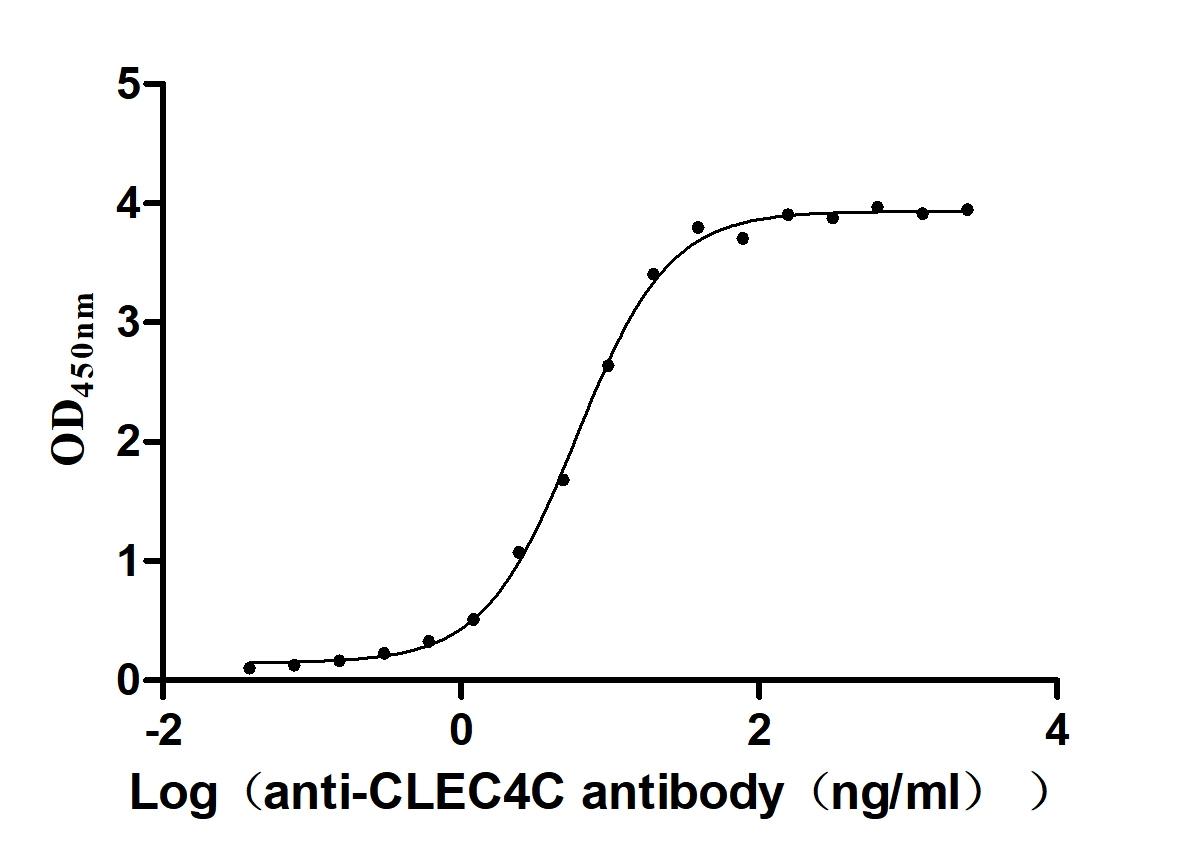

-AC1.jpg)
